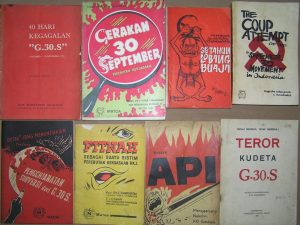Yesterday, The Guardian published a fascinating article shedding fresh light on the role played by the United Kingdom in the ghastly liquidation of the Indonesian Communist Party (PKI) in the mid-1960s. Based on recently declassified documents from the U.K. Foreign Office, the article reveals that British propagandists secretly egged on prominent Indonesian anti-communists, including senior army commanders, to launch the campaign of mass murder.
The destruction of the PKI by the Indonesian army, which followed a mysterious coup attempt by dissident army officers on the night of September 30, 1965, amounted to “one of the largest and swiftest, yet least examined instances of mass killing and incarceration in the twentieth century,” in the words of historian Geoffrey Robinson. At least 500,000 people linked to the PKI, and as many as a million, were murdered during 1965 and 1966, a purge that led to the downfall of Sukarno and his replacement by Gen. Suharto, whose New Order would govern Indonesia until 1998.
Ahead of the grisly campaign, The Guardian reports, the British launched a propaganda campaign calling for “the PKI and all communist organizations” to “be eliminated.” The campaign warned that Indonesia would be in danger “as long as the communist leaders are at large and their rank and file are allowed to go unpunished.”
According to The Guardian report, the British propaganda campaign was intended as a response to Indonesian President Sukarno’s campaign of hostility toward the creation of the Malaysian Federation in 1963. Sukarno viewed the creation of Malaysia, which brought together independent Malaya with the British colonies of Singapore, Sarawak, and British North Borneo (Sabah), as a plot to perpetuate London’s colonial influence over Southeast Asia.
To forestall its creation, he launched a diplomatic and low-level military campaign known as Konfrontasi (Confrontation), which involved armed incursions by Indonesian troops into Malaysia, where in some instances they clashed with British and Commonwealth troops. In 1965, as Sukarno began to tilt leftward in both his foreign and domestic policies, the declassified documents show, specialists from the Foreign Office’s information research department were sent to Singapore to produce agit-prop designed to undermine Sukarno’s regime.
This involved the production of a newsletter purporting to be produced by Indonesian émigrés and targeted at an array of prominent and influential individuals, including army generals, which extended up to Sukarno himself. It also supplied a radio station in Malaysia that broadcast anti-communist messages into Indonesia.
This propaganda effort was already well established when the dissident army officers launched their coup attempt in September 1965, kidnapping and killing six senior army officers. After quashing the coup, Gen. Suharto coordinated the mass murder of Indonesian communists. At this point, London’s propaganda began openly inciting the elimination of the PKI.
In a special issue of the newsletter, London’s propagandists issued a demand that “in the name of all patriotic people that this communist cancer be cut out of the body of the state.” The PKI “is now a wounded snake,” they added. “Now is the time to kill it before it has a chance to recover.” In another issue of the newsletter, they urged Indonesian patriots: “The PKI and all it stands for must be eliminated for all time.”
The U.K. Foreign Office has always denied Britain had any hand in the violence that swept like a bloody tide across the Indonesian archipelago after September 1965. But The Guardian argues that these revelations “show British intelligence agencies and propaganda specialists were complicit, carrying out covert operations to undermine Sukarno’s regime and eliminate the PKI.”
The documents offer additional evidence of the way in which the Indonesian bloodbath of 1965-66 was enmeshed within the power calculations of the Cold War. The American role in this ghastly episode is already well documented.
In 2017, the National Security Archive published a batch of U.S. diplomatic cables covering the mid-1960s in Indonesia. These documents confirmed not just that U.S. authorities backed Suharto’s purge, something that was widely known; they also showed that U.S. officials knew most of his victims were entirely innocent and even offered help to suppress media coverage of the killings. As John Roosa at the University of British Columbia told the journalist Vincent Bevins in 2017, “the U.S. was part and parcel of the operation, strategizing with the Indonesian army and encouraging them to go after the PKI.”
This revelation also highlights the ahistorical nature of the notion of the “rules-based international order,” around which Washington and London are now building their joint effort to curb and contain the growing power of China. The U.S. in particular has premised its present strategic competition with China on a sanitized vision of the era of American primacy that followed the end of World War II. With varying degrees of subtlety, the Trump and Biden administrations have both implicitly depicted U.S.-China competition as a struggle between an essentially benign status quo power and an essentially malign revisionist one.
But the horrific events in Indonesia in the mid-1960s suggest that this appeal to a rose-tinted era of peace, prosperity, and international order obscures the incredible human cost at which the present “rules-based order” was created, to say nothing of the fact that it is neither orderly nor, in the final analysis, rules-based.
This has important implications for policymakers in Washington and other Western capitals. It suggests that while many foreign countries, especially those in Southeast Asia, desire a robust U.S. economic and security presence, they have enough experience with the hard edge of U.S. primacy not to idealize American power. Nor are they generally inclined, for all their undoubted concerns about China’s growing power, to view it as an unalloyed evil. Indeed, many governments view the U.S. and China as basically analogous: large powers, both bent on maximizing their perceived interests, and both tinted varying and shifting shades of gray.
































